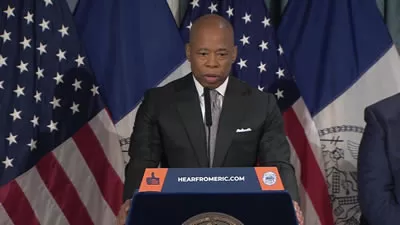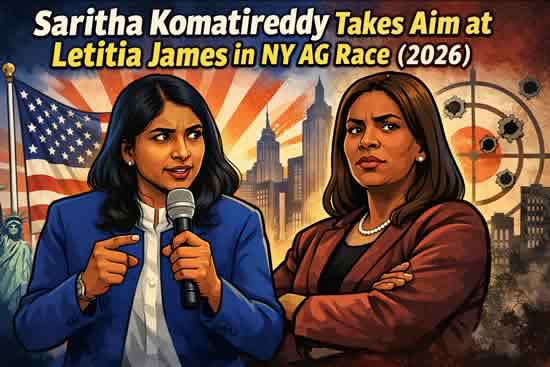Minimum Hourly Rate Is Now $19.56 and Will Be Adjusted Annually for Inflation. Workers Now Earn Nearly $850 Million More Annually Since Department of Consumer and Worker Protection Began Enforcing Minimum Pay Rate
– New York City Mayor Eric Adams and New York City Department of Consumer and Worker Protection (DCWP) Commissioner Vilda Vera Mayuga today announced that, effective immediately, the city’s minimum pay rate for app-based restaurant delivery workers is increasing to at least $19.56 per hour before tips. The $19.56 rate reflects the 2024 phase-in rate of $18.96 and an inflation adjustment of 3.15 percent – up from an average of just $5.39 per hour before enforcement began. When the rate is fully phased-in on April 1, 2025, workers will earn at least $19.96 per hour with an adjustment for inflation. Since DCWP began enforcing the minimum pay rate in December 2023, apps have paid the city’s delivery workers $16.3 million more per week across the workforce – an increase of 165 percent – totaling an additional $847.6 million annually.
“Our delivery workers have consistently delivered for us – and today the city is delivering for them,” said Mayor Adams. “I was raised by a working mother who supported my five siblings and me, and there are thousands of delivery workers doing the same to support themselves and their families. And while wages have not kept up with the rising cost of living, since the new pay rate has been enforced, delivery workers have already seen a 165 percent increase in their pay per week. This is what it looks like to stand with working-class New Yorkers and build a fairer economy.”
“Today’s scheduled pay increase means we are delivering on our promises to the more than 60,000 app-based delivery workers in our city and ensuring they get compensated in accordance with the nation’s first minimum pay rate law,” said Deputy Mayor for Housing, Economic Development, and Workforce Maria Torres-Springer.“Thank you, Mayor Adams and Commissioner Mayuga, for ensuring that some of our city’s hardest workers are earning a more livable wage.”
“With the full range of flavors New York City has to offer at their fingertips, New Yorkers get instantaneous room service at all hours – and people who make that happen have high-risk, high-difficulty jobs. With this pay raise, we acknowledge their contributions to our city and continue to make their working life more manageable,” said Deputy Mayor for Operations Meera Joshi. “With thanks to DCWP, we look forward to continuing this progress, using data to make their workplaces – the streets – some of the safest in the nation for delivery.”
“The minimum pay rate has been enormously successful in raising wages for our city’s delivery workers and providing them greater means to support themselves and their families,” said DCWP Commissioner Mayuga. “Any delivery worker with questions about the minimum pay rate, or any of their other worker rights, should reach out to us. Thank you to our city’s tens of thousands of delivery workers for fighting for a dignified wage and to Mayor Adams for centering working-class New Yorkers in all that we do.”
DCWP is actively monitoring compliance, which includes analyzing monthly reporting from the apps. Based on compliance data submitted by Uber Eats, DoorDash, and Grubhub, which together make up 95 percent of the market:
- Workers are making a more livable wage. Delivery workers are earning $16.3 million per week more in wages. These workers went from being paid a rate of $5.39 per hour before tips – far below the minimum wage – to earning at least $17.96 per hour before tips.
- Apps are using the workers’ time more efficiently while maintaining the same number of app-based delivery workers (over 60,000). The number of orders per week and the number of workers performing deliveries have remained steady since enforcement of the minimum pay rate began, and the amount of time workers spent waiting for trips decreased.
- Consumers and restaurants have not been negatively affected. There was no change in the number of deliveries performed by workers for Uber Eats, DoorDash, or Grubhub, which together average about 2.6 million deliveries a week, both before and after enforcing the rate.
In June 2023, the Adams administration announced the final minimum pay rule, effective July 12, 2023, following a monthslong rulemaking process that included two public hearings and thousands of public comments. In early July, the major delivery apps sued the city, seeking to stop the minimum pay rate from taking effect. In September, the New York State Supreme Court ruled in the city’s favor, allowing enforcement of the minimum pay rate of $17.96 to begin. The apps appealed the State Supreme Court’s ruling, and in late November, the Appellate Division, First Judicial Department denied the appeals, paving the way for DCWP to finally begin enforcing the minimum pay rate.
In September 2021, the New York City Council passed Local Law 115, requiring DCWP to study the pay and working conditions of app-based restaurant delivery workers and to establish a minimum pay rate for their work based on the study results. DCWP published its study in 2022, which drew from data obtained from restaurant delivery apps, surveys distributed to delivery workers and restaurants, testimony, extensive discussions with stakeholders on all sides, and publicly available data.
This minimum pay rate is just one part of the city’s holistic approach to improving working conditions for delivery workers. In his 2024 State of the City address, Mayor Adams announced plans to create the New York City Department of Sustainable Delivery, a first-in-the-nation regulatory entity to establish clear goals and guidelines for the future of delivery. In February 2024, Mayor Adams and the New York City Department of Transportation announced five public e-battery charging locations as part of the city’s new, six-month pilot program to test safe, public charging of lithium-ion batteries by an initial group of 100 delivery workers. The Adams administration has also launched a program for the first-of-its-kind street Deliveristas Hubs, utilizing existing infrastructure to provide a place for workers to rest and recharge.
Delivery Workers can visit DCWP’s Third-Party Food Delivery Services page or call 311 and say “delivery worker,” to learn more about the minimum pay rate. Workers can also submit questions or file complaints related to the minimum pay rate or other delivery worker laws in multiple languages online or by contacting 311.
“Our 60,000-plus delivery workers make New York City run. Whether a pandemic or natural disaster, they are out in the streets braving dangerous traffic to bring New Yorkers whatever they need,” said New York State Assemblymember Jennifer Rajkumar. “Many of them are immigrants working day and night to achieve the American Dream. Just as they deliver for us, we will deliver for them. We made history by implementing a first-of-its-kind minimum hourly pay rate of $18.96, which will increase to $19.96 – nearly four times the previous average hourly pay rate of $5.39 before tips. These workers deserve living wages, ensuring they can earn a decent living, stand on their own two feet, and receive the respect and dignity they earned. The guaranteed wages that Mayor Adams and Commissioner Mayuga have instituted speak to our very humanity as a city.”
“Our city’s hardworking and dedicated delivery workers deserve a minimum pay rate that is reflective of the value of their labor,” said New York City Council Speaker Adrienne Adams. “Implementing an increased rate for app-based delivery workers will mean more money in their pockets to meet their daily needs. The City Council is proud to have enacted unprecedented protections for deliveristas, and we will continue to prioritize their safety, dignity, and well-being.”
“As chair of the Committee on Consumer and Worker Protection and former commissioner of the Department of Consumer and Worker Protection, I welcome news that delivery workers will benefit with a new minimum pay rate,” said New York City Councilmember Julie Menin. “The new rates ensure that New York City remains a leading advocate for delivery workers.”
“As we celebrate this milestone that formally recognizes the enormous contribution of app delivery workers to our city, we’re proud to see that minimum pay is delivering real benefits to these essential workers, while maintaining strong outcomes for our city’s restaurants,” said Ligia Guallpa, executive director, Worker’s Justice Project. “Thank you to the Department of Consumer and Worker Protection and the Adams administration for having the vision to know that the right to decent pay for app delivery workers is fundamental to our city’s collective growth.”
“Our delivery worker brothers and sisters are essential to everyday life in our city,” said Bhairavi Desai, executive director, New York Taxi Workers Alliance. “They made daily life possible for tens of thousands of us through COVID and perform heroic work through storms and crisis. Their labor, done with risk of accidents and assault and over long hours, has made companies ultra wealthy, and in the case of Uber in particular, saved them from collapse through the pandemic when ride-hailing was at a standstill. It was sickening to see the companies kick and scream against meeting compliance over basic minimum wage – especially for workers who bear all the costs, but all the more thrilling when the mayor stood firm with Los Deliveristas Unidos to beat them. We are proud to see the good work the city did with us on establishing minimum pay be extended to our delivery brothers and sisters. We share the streets, we share the struggle, and we share the triumphs. We commend Mayor Adams, Deputy Mayor Torres-Springer, and DCWP Commissioner Mayuga for this groundbreaking city victory for workers in the so-called gig economy, and we congratulate the indomitable Los Deliveristas Unidos and Worker Justice Project whose organizing made this win possible.”
“New York City’s more than 65,000 delivery workers keep New Yorkers fed, and they deserve to be compensated fairly so they can keep their own families fed,” said Vinny Alvarez, president, New York City Central Labor Council, AFL-CIO. “Los Deliveristas Unidos and the Workers Justice Project faced enormous obstacles along the road to winning the guaranteed minimum wage last year, including intense opposition from big app companies. But they persevered, securing an additional $16.3 million a week across their essential workforce, and with today’s announcement they’ve once again helped set a new standard for delivery workers in this city, this state, and across the nation. We thank Mayor Adams and DCWP for their efforts in ensuring that the minimum pay rate is protected and enforced across our city.”
“Delivery workers keep our city fed and running,” said Kazi Fouzia, director of organizing, Desis Rising Up and Moving. “We celebrate the minimum wage increase honoring the labor of workers. But we are still struggling from corporate maneuvers to reduce hours, deactivate accounts, manipulate schedules, and prioritize profits over the needs of workers. We will continue to organize and build power to hold them to account, and work with the administration to find solutions that support delivery workers.”
“This inflation-adjustment increase in the minimum pay rate of app-based food delivery workers represents not only progress in achieving fair pay, but also safer work conditions for this essential workforce,” said Maria Figueroa, dean, School of Labor Studies at SUNY Empire. “As workers receive higher pay, they experience less pressure to complete a high number of deliveries in a short time frame. This enables delivery workers to work in a way that is safe for them and the public. Additionally, this raise can give a boost to New York’s economy, as the increased income of delivery workers is spent in local businesses. I commend Mayor Adams, Deputy Mayor Torres-Springer, and DCWP Commissioner Mayuga for this historic policy measure, which means a step forward on the path to safer streets and a more equitable economy for all New Yorkers.”
“Today’s announcement is a huge step forward for everyone who uses our city’s streets,” said Elizabeth Adams, deputy executive director of public affairs, Transportation Alternatives. “For far too long, delivery apps have demanded impossible delivery times for less than minimum wage in a constant race to the bottom. New York City’s streets are workplaces for our thousands of delivery workers, and fair pay means safer streets and safer working conditions. Worker justice, fair pay, and safety are inextricably interlinked, and we will keep fighting to ensure our streets are safe for everyone.”
“The minimum pay rate for app-based delivery workers has been an historic achievement for New York City,” said Charlene Obernauer, executive director, New York Committee for Occupational Safety and Health. “These workers have braved the most difficult circumstances to deliver much needed food to our communities, all while major app companies have exploited their labor, paid them poverty wages, and pushed them into faster and more unsafe delivery times. We commend Mayor Adams and Commissioner Mayuga for making this right a reality and know that enforcement will be actively conducted to protect workers. Most importantly, I want to raise up in solidarity the delivery workers who fought for this protection and won fair pay for their industry.”
April 1, 2024 Manhattan New York
Source: NYC.gov – Midtown Tribune news –
Big New York news BigNY.com














